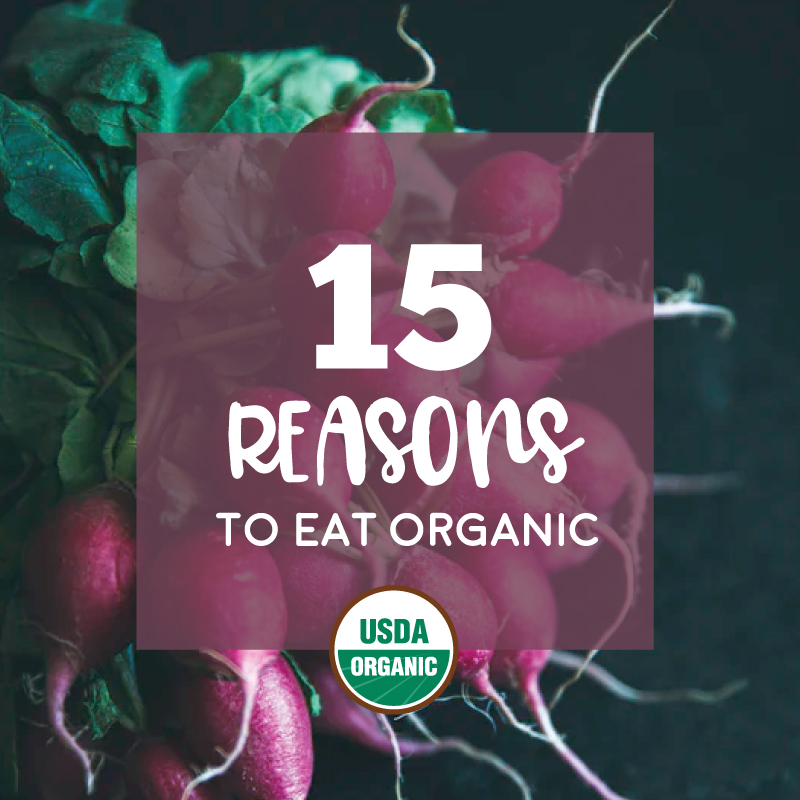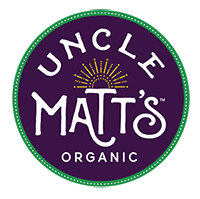15 Reasons To Eat Organic

Imagine taking a peaceful morning stroll through a lush, natural field near your home. The earth beneath your feet is firm and uneven, filled with the fragrant smells of thriving crops. As you walk, you notice the intricate root systems and abundance of wildlife around you. You pause to admire the beauty of nature at work, exchanging a friendly wave with a seasoned farmer who shares your commitment to organic farming.
This idyllic scene is not a dream – it’s the reality of supporting an organic lifestyle. By choosing organic products, you are supporting harmonious farming practices that prioritize the health of the environment and the absence of harmful pesticides. Here are 15 reasons why you should consider embracing an organic lifestyle.
- Persistent Pesticides. Insecticides, fungicides and weedkillers are held to strict standards in organic food production. While the use of any toxic treatments are prohibited, farmers may make approved applications to their crops as long as they are derived from natural sources and are on the list of permitted substances by the National Organic Standards Board and the National Organic Program.
- GMOs. Genetically modified or engineered foods and ingredients are prohibited in organic farming. By eating organic, you avoid consuming GMOs. The Organic Trade Association explains the farming practices adhered to by growers in order to prevent contamination and exposure to GMOs.
- Artificial colors, flavors and preservatives. You’ll find that less than 40 synthetic additives are federally approved for use in organic production, and even then only after they’ve been rigorously reviewed. The Environmental Working Group compares the stark differences between organic and the thousands of chemical substances that can be used in conventionally packaged foods.
- Soil Health. Rather than applying synthetic fertilizers, organic farmers promote fertile soil through natural practices approved by the USDA. Cover cropping and composting foster well-nourished soil which in turn encourages strong plants that are better equipped for disease resistance, drought survival and insect diversity.
- Nutrition. Numerous studies acknowledge a correlation between increased health benefits from consuming organic foods over conventional. From onions to dairy to tomatoes, evidence has emerged to show food is more nutrient dense when grown organically.
- Food Future. Dollars spent at the grocery store have influence on organic supply and demand. As spending habits shift towards organic, the food industry will do more to meet this need. Large retailers like Costco serve as a real-time example of how organic food availability can change with consumer demand.
- Sewage Sludge. In conventional farming, dried waste derived from wastewater treatment plants can be used agriculturally as fertilizer. This isn’t allowed in organic farming. Due to unknown and potentially toxic compounds present in this sludge, applying these processed solids is not permitted for organic composting.
- Irradiation. Irradiated food has been treated with ionizing radiation to kill bacteria and pathogens that could lead to food poisoning. While irradiation is regulated by the FDA, irradiated food cannot be used in organic food production.
- Climate Change. Rising atmospheric carbon dioxide levels are a growing concern for global warming. Organic agriculture naturally combats this through a focus on soil health. The Cornucopia Institute details how organic practices filter carbon dioxide from the atmosphere. Data provided by the Rodale Institute explains how a switch to regenerative farming could sequester more than 100% of current annual CO2 emissions.
- Pollinators. Toxic chemical pesticides prohibited for use in organic are not only detrimental to human health but can also be harmful to honeybee populations. A natural, holistic approach to organic farming fosters a biodiverse environment for bees to flourish. Studies demonstrate how organic farms support more pollinators than conventional.
- Farmworkers. Conventional farmers and their neighbors are at an increased risk for exposure to harmful toxic pesticides. The Scientific American discusses the potential impacts of “pesticide drift” from those who live and work near large farms who frequently spray toxic chemicals. The Organic Center highlights the importance of protecting those who produce our food by promoting organic practices.
- Environment. Decreased water contamination, less reliance on unnatural fertilizers, increased biodiversity and a lesser impact on global warming are all reasons to promote organic for a well-rounded approach to our environmental health.
- Contamination. Consuming organic ensures the absence of GMOs. The Center for Food Safety lists examples of conventional farms that were contaminated by genetically engineered crops, pollen and seeds. Farming organically reduces the risk of contamination from GMOs.
- Water. Organic farms do not contribute to water pollution. Run off from conventional farms that use toxic chemical applications have the potential to contaminate ground water and other nearby bodies of water. Buffer zones and cover cropping are organic approaches to protecting both the soil and water supply from water contamination.
- Cancer. A study shared by JAMA Internal Medicine found that in French adults there was less prevalence of cancer in those who consumed significant amounts of organic food compared to those who did not.
Editor’s Note: This post was originally published in September 2019 by our friends at Only Organic and has been updated for freshness, accuracy and comprehensiveness.


